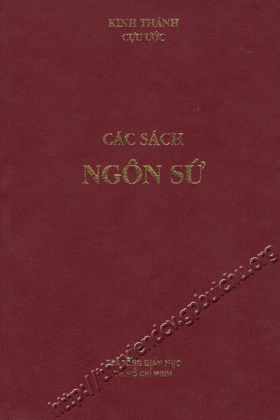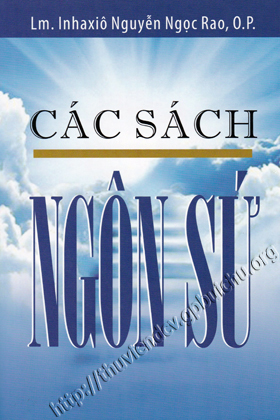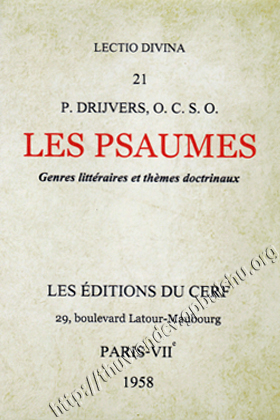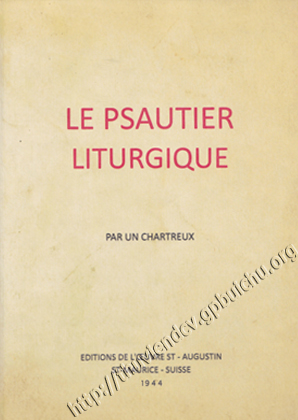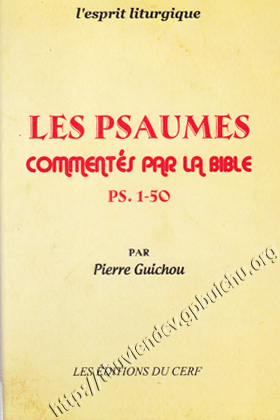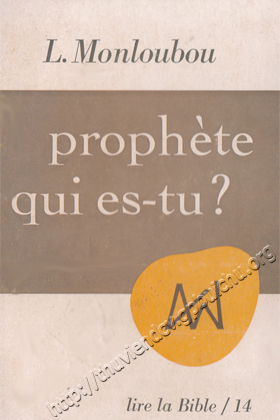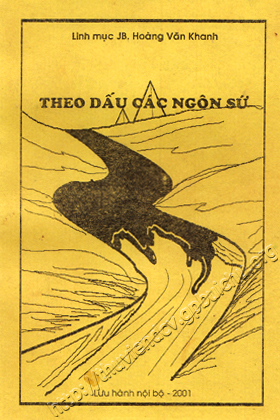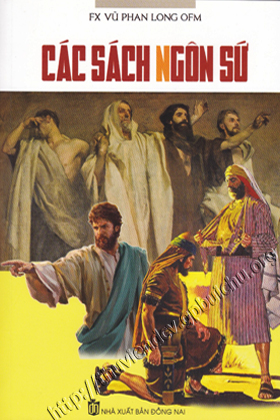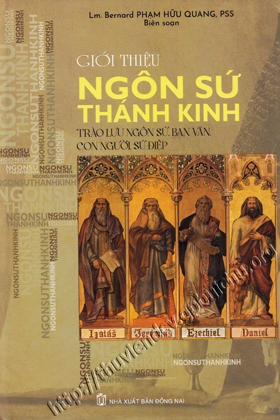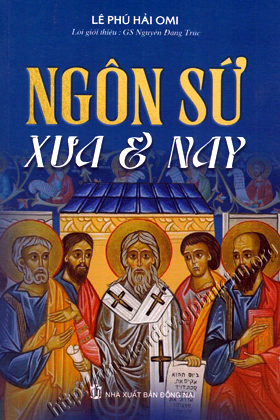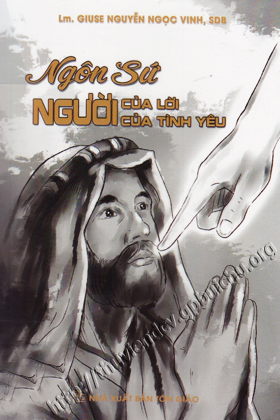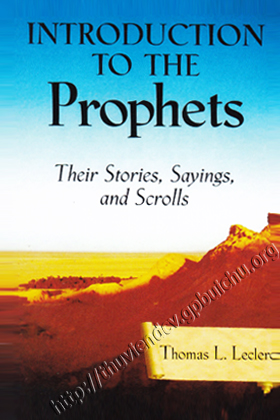
| Introduction to the Prophets | |
| Tác giả: | Thomas L. Leclere |
| Ký hiệu tác giả: |
LE-T |
| DDC: | 223.2 - Các sách Ngôn sứ |
| Ngôn ngữ: | Anh |
| Số cuốn: | 2 |
Hiện trạng các bản sách
|
|
||||||||||||||||||||||||||||||||
» Thêm vào danh sách tác phẩm yêu thích
| List of Illustrations | XV |
| Introduction | xvii |
| The Goal | xvii |
| Special Features of This Book | xviii |
| Some Technical Details | XX |
| Chapter 1. Prophecy in Its Various Contexts | 1 |
| Geographical Context | 2 |
| The Pertile Crescent | 2 |
| Historical Context | 4 |
| From Joseph to Saul | 4 |
| From David to the Retum from Exile | 5 |
| Social and Cross-Cultural Contexts | 6 |
| Cultural Assumptions | 8 |
| Religious Context | 10 |
| Literary Context | 12 |
| The Development of Prophetic Literature | 12 |
| Biblical Books as Literary Works | 14 |
| Canonical Context | 14 |
| Summary | 16 |
| Chapter 2. Intermediaries and Prophets in the Ancient Near East | 18 |
| Gods and Heavenly Rule | 19 |
| Kings and Earthly Rule | 21 |
| Priests and Temple Power | 24 |
| Divination | 27 |
| Inductive or Instrumental Divinatíon | 27 |
| Intuitive or Mediated Divination | 29 |
| Evidence from Egypt | 29 |
| Evidence from Mesopotamia | 30 |
| Inductive Divination | 30 |
| Intuitive Divination | 31 |
| Texts from Mari | 32 |
| The Signiíicance of These Texts | 34 |
| Summary | 35 |
| Chapter 3. Stories of Prophets in the Pentateuch | 37 |
| The Documentary Hypothesis | 38 |
| Heroes of the North: Abraham, Moses, and Mừiam (E) | 41 |
| Abraham | 41 |
| Moses | 42 |
| The Call | 42 |
| The Golden Calf | 44 |
| Miriam | 46 |
| Balaam | 47 |
| The Book of Deuteronomy | 49 |
| The Book of Deuteronomy and the Documentary Hypothesis | 50 |
| The Book of Deuteronomy and Prophecy | 51 |
| Moses as Prophet | 52 |
| Deuteronomic Criteria for Judging Authentic Prophets | 53 |
| Deuteronomy and the Covenant | 56 |
| Chapter 4. Stories of Prophets in the Deuteronomistic History | 61 |
| "Deuteronomistic History" or the "Former Prophets"? | 61 |
| Prophets and Prophecy in the Deuteronomistic History | 62 |
| Joshua as Prophet | 62 |
| Deborah: Prophetess and Judge | 63 |
| The Rise of Kingship | 64 |
| Samuel and the Emergence of Prophecy | 65 |
| The Call | 70 |
| Samuel's Last Prophecy | 71 |
| The Rise of David | 72 |
| Nathan, Prophet in David's Royal Court | 72 |
| Solomon and the Division of the Kingdom | 79 |
| Ahijah the Shilonite Designates a New King | 81 |
| Rehoboam, Son of Solomon | 82 |
| Shemaiah Prevents War | 82 |
| "The Sins of Jeroboam" and the Man of God | 83 |
| From Jeroboam to Elijah | 85 |
| Baal, Canaanite God of Fertility and Storm | 86 |
| The Elijah Stories | 87 |
| Drought in the Land of Baal | 87 |
| The Contest on Mount Carmel | 88 |
| Elijah at the Mountain of God | 89 |
| Naboth's Vineyard | 91 |
| Micaiah ben Imlah | 92 |
| Elijah's Fiery Departure | 93 |
| Evidence of Prophetic Actívity among Israel's Neighbors | 94 |
| The Mesha Inscription | 94 |
| The Zakkur Inscription | 96 |
| Elisha the Prophet | 97 |
| Concluding Comments | 97 |
| Chapter 5. The Prophetic Books | 100 |
| How to Proceed: Canonical or Chronological Order? | 100 |
| A Variety of Terms | 101 |
| The Content of Prophetic Books | 102 |
| The Formation of Prophetic Books | 103 |
| Prose and Poetry | 104 |
| Important Themes and Mọtifs | 107 |
| Ethical Conduct | 108 |
| Justice | 109 |
| Judgment | 110 |
| The Courtroom | 111 |
| Divine Sovereignty | 112 |
| Israel and Zion/Jerusalem | 113 |
| Repentance and Hope | 114 |
| The World of the Eighth-Century Prophets | 115 |
| From Elisha to Jeroboam II | 115 |
| The Reign of Jeroboam II | 116 |
| Economic Prosperity and Social Injustice | 116 |
| 1. The Monarchy | 118 |
| 2. Urbanization | 118 |
| The Rise of As9yria | 120 |
| Chapter 6. Amos of Tekoa, Prophet of Doom | 123 |
| The Prophet | 123 |
| The Superscription | 123 |
| The Call | 124 |
| The Book | 126 |
| Signiíicance of Editorial Activity | 128 |
| Important Themes and Passages | 129 |
| Judgment against the Kingdoms | 129 |
| Judgment against Israel | 130 |
| Judgment | 131 |
| Social Justice | 132 |
| The Cult | 133 |
| The Prophet as Intercessor | 134 |
| Amos and the Traditions of Israel | 135 |
| The Day of Yahweh | 136 |
| Election | 137 |
| Exodus | 138 |
| Amos in Later Traditions | 139 |
| Chapter 7. Hosea, Prophet of the Covenant | 142 |
| The Times | 142 |
| The Prophet | 144 |
| Biographical Iníormation | 144 |
| Location | 145 |
| Date | 146 |
| The Book | 146 |
| Important Themes and Passages | 147 |
| Marriage and the Covenant | 147 |
| Justice and Worship | 149 |
| Judgment | 150 |
| Divine Compassion | 152 |
| Fertility | 153 |
| Hosea and the Traditions of Israel | 155 |
| Ancient Heroes: Abraham, Jacob, and Moses | 155 |
| Exodus and the Wilderness | 156 |
| Covenant and Knovvledge of God | 157 |
| Hosea in Later Traditions | 159 |
| Chapter 8. Isaiah, Prophet of Zion | 162 |
| Special Issue: One Book, Three Isaiahs | 162 |
| The Status of Jerusalem | 162 |
| The Rulers of Kingdoms | 163 |
| The Enemies of Judah | 163 |
| The Book | 164 |
| The Prophet | 166 |
| The Call | 166 |
| The Times | 167 |
| The Syro-Ephraimite War of 734-732 | 168 |
| Theological Signiíicance | 170 |
| The Fall of Samaria in 722/721 | 170 |
| Theological Signiíicance | 171 |
| The Siege of Jerusalem in 701 | 171 |
| Theological Signiíicance | 173 |
| Important Themes and Passages | 174 |
| Survey of Major Concerns | 174 |
| David and Jerusalem: Royal Theology | 177 |
| The House of David | 177 |
| The City of Jerusalem | 178 |
| Social Justice | 180 |
| God Rules over All | 181 |
| Trust in Yahweh | 182 |
| Eschatology | 183 |
| "That Day" | 183 |
| The Remiiant | 184 |
| First Isaiah in Later Traditions | 185 |
| Chapter 9. Micah of Moresheth | 188 |
| The Times | 188 |
| The Prophet | 189 |
| TheBook | 190 |
| Important Themes and Passages | 191 |
| Justice | 191 |
| Unjust Acquisition of Land and Property | 192 |
| Oppression of the Poor | 192 |
| côrrupt Leaders | 193 |
| The Call to "Do Justice" | 194 |
| Judgment | 195 |
| Idolatry | 195 |
| Misplaced Coníidence | 196 |
| Legal Language | 197 |
| Restoration | 199 |
| Zion VVlll Be Exalted | 199 |
| A Remnant Shall Return | 200 |
| A King Shall Rule | 200 |
| Micah and the Traditions of Israel | 201 |
| Micah in Later Traditions | 202 |
| Chapter 10. Three Late Seventh-Century Prophets: | |
| Zephaniah, Nahum, Habakkuk | 205 |
| The Times | 205 |
| Josiah and "the Book of the Law" | 207 |
| Special Issue: Assyrian Prophecy and Prophetic Texts | 209 |
| The Book of Zephaniah | 212 |
| The Prophet | 212 |
| The Book | 212 |
| Important Themes and Passages | 213 |
| The Day of the Lord | 213 |
| Judgment | 214 |
| The Remnant | 216 |
| Zephaniah and the Traditions of Israel | 217 |
| Zephaniah in Later Traditions | 218 |
| The Book of Nahum | 219 |
| The Prophet and His Times | 219 |
| The Book | 220 |
| Important Themes and Passages | 221 |
| The Divine Warrior | 221 |
| Divine Sovereignty | 222 |
| Divine Justice | 223 |
| Nahum and the Traditions of Israel | 224 |
| Nahum in Later Traditions | 225 |
| The Book of Habakkuk | 226 |
| The Prophet and His Times | 226 |
| The Book | 227 |
| Important Themes and Passages | 228 |
| Justice in the Human Realm | 228 |
| Divine Justice | 229 |
| Faith and the Reliability of God's Plan | 230 |
| "A Prayer of the Prophet Habakkuk" | 231 |
| Habakkuk and the Traditions of Israel | 232 |
| Habakkuk in Later Traditions | 232 |
| Chapter 11. The Fall of Jcrusalem: | |
| Jeremiah, Lamentations, and Obadiah | 235 |
| The Times | 235 |
| Trouble in David's Royal House | 236 |
| The Book of Jeremiah | 239 |
| The Prophet | 239 |
| Family and Priestly Background | 239 |
| The call | 240 |
| The Persecuted Prophet | 242 |
| The Lamentations of Jeremiah | 243 |
| The Book | 246 |
| Jeremiah and the Deuteronomists | 246 |
| Baruch the Scribe and Jeremiah's Book | 247 |
| Important Themes and Passages | 248 |
| The Covenant | 248 |
| The Nature of the Covenant | 249 |
| Violations of the Covenant | 251 |
| 1. Idolatiy | 251 |
| 2. Inịustice | 253 |
| The Covenant Curse: Destruction | 255 |
| New Covenant | 256 |
| Misdirected Faith | 257 |
| The Temple Sermon | 258 |
| Foreign Alliances | 259 |
| Prophets and Prophecy | 260 |
| Other Prophets | 260 |
| Conữontation with Hananiah | 261 |
| Deuteronomic Criteria | 262 |
| Prophet as Intercessor | 263 |
| Hope | 264 |
| The Remnant | 265 |
| Buying Property and Building Houses | 267 |
| Jeremiah and the Traditions of Israel | 268 |
| Jeremiah in Later Ttaditions | 269 |
| The Book of Lamentations | 272 |
| The Book of the Prophet Obadiah | 274 |
| The Prophet and His Times | 274 |
| The Book | 275 |
| Important Themes and Pạssages | 275 |
| The Sins of Edom | 275 |
| The Day of the Lord | 276 |
| Divine Sovereignty | 276 |
| Obadiah and the Traditions of Israel | 276 |
| Obadiah in Later Traditions | 277 |
| Chapter 12. Ezekiel, Prie8t and Prophet in Exile | 278 |
| The Times | 278 |
| Life in Exile | 279 |
| Life in Jerusalem and the Continuation of Worship | 280 |
| Spedal Issue: The Grovving Importance of Torah | 280 |
| The Prophet | 281 |
| The Call | 282 |
| The Book | 283 |
| Important Themes and Passages | 285 |
| Prophetic Signs | 285 |
| The Prophet as Intercessor | 287 |
| The Righteous Cannot Save the Wicked | 287 |
| Moral Blackmail | 287 |
| Moral Pressure | 288 |
| Ezekiel's Presentation of God | 289 |
| The Holy and the Proíane | 290 |
| The Sin of Judah | 291 |
| History of Sin | 291 |
| Idolatry | 292 |
| Injustice | 292 |
| The Consequence of Sin: The Departure of the Glory of the Lord |
293 |
| Ezekiel and Jeremiah Compared | 293 |
| Personal Responsibility | 295 |
| Hope for the Future | 296 |
| God, the Shepherd | 296 |
| Vision of the Dry Bones | 297 |
| The Restored Temple, City, and Land | 29 7 |
| 1. The Temple | 297 |
| 2. The River Flowing from the Temple | 298 |
| 3. New Leadership | 298 |
| 4. The Land Reapportioned | 299 |
| Ezekiel and the Traditions of Israel | 299 |
| Prophetic Traditions | 299 |
| Priestly Traditions | 300 |
| Mythic Traditions | 301 |
| Ezekiel in Later Traditions | 301 |
| Chapter 13. The Second Isaiah: Consolation in Exile | 304 |
| The Times | 304 |
| Nabonidus, Babylon's Last King | 304 |
| Cyrus, the Persian | 305 |
| The Astral Cult in Babylon | 306 |
| Theological Crisis | 308 |
| The Prophet | 309 |
| The Call | 309 |
| The Book | 310 |
| Important Themes and Passages | 312 |
| The Sovereignty of Yahvveh | 312 |
| Creation | 312 |
| Redemption: God's Power to Save | 313 |
| 1. ANevvExodus | 316 |
| 2. Cyrus, The Lord's Anointed | 317 |
| Monotheism and the Denunciation of Idols as Unreal | 319 |
| 1. The Idols on Trial | 320 |
| 2. Parody of Idol Makers | 322 |
| 3. No God but Yahweh | 322 |
| The Servant of Yahweh | 323 |
| The First Song | 324 |
| The Second Song | 325 |
| The Third Song | 325 |
| The Fourth Song | 326 |
| Reprise: The Role of the Prophet | 327 |
| Second Isaiah and the Traditions of Israel | 328 |
| Second Isaiah in Later Traditions | 330 |
| Chapter 14. Prophecy after the Exile (Part 1): | |
| Haggai, Zechariah, and Malachi | 333 |
| The Times | 333 |
| The Decree of Cyrus and the Return | 333 |
| Resettlement Próblems | 334 |
| Rebuilding the Temple | 335 |
| The Book of the Law | 336 |
| The Book of Haggai | 337 |
| The Prophet | 338 |
| The Book | 338 |
| Important Themes and Passages | 339 |
| Call to Build the Temple | 339 |
| God, the Giver of Fertility and Prosperity | 339 |
| A Restored Kingdom? | 340 |
| Haggai and the Traditions of Israel | 341 |
| Haggai in Later Traditions | 341 |
| The Book of Fừst Zechariah | 342 |
| The Prophet | 342 |
| The Book | 342 |
| Important Themes and Passages | 343 |
| Return to Me! | 343 |
| DoJustice! | 343 |
| Visions, Angels, and the Satan | 344 |
| Priestly Concerns | 345 |
| Zechariah9—14 | 346 |
| The Book | 347 |
| Important Themes and Passages | 348 |
| Sovereignty of Yahweh | 348 |
| Yahweh, the Divine Warrior | 348 |
| Yahweh, the Shepherd | 349 |
| Ịerusalem and the House of David | 349 |
| Zechariah and the Traditions of Israel .... | 350 |
| Zechariah in Later Traditions | 351 |
| The Book of Malachi | 352 |
| The Prophet | 352 |
| The Book | 353 |
| Important Themes and Passages | 354 |
| Èlection | 354 |
| Proper Worship | 354 |
| Faithlessness | 355 |
| Prepare the Way | 356 |
| Moses and EIijah | 357 |
| Malachi and the Traditions of Israel | 357 |
| Malachi in Later Traditions | 358 |




